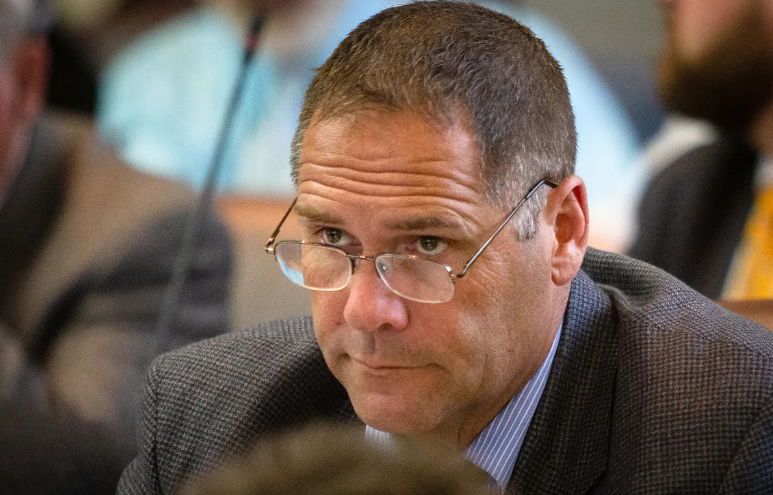
Addiction affects nearly all Mainers, regardless of wealth, education or location. That’s something state Sen. Brad Farrin knows all too well.
Farrin’s 26-year-old daughter, Haley, was working at her accounting job one day in July. The next day, she died of a fentanyl overdose. It devastated her family and made her one of 565 Mainers to lose their life to a fatal overdose between last January and October, a stark figure that put Maine on pace to have its deadliest year in history for drug overdoses.
“Haley was full of life and got into a place that she did not belong in,” Farrin said. “It’s happening across our state.”
The experience led Farrin to take the lead on bills this year aimed at addressing substance misuse by focusing on three policy topics: education, enforcement and treatment. The Republican from Norridgewock should be able to find common ground with Democrats in Augusta, though the sides may disagree about how to balance those subjects.
Among Farrin’s bills is one that would make it easier for law enforcement to use social media to follow trafficking. Another he is working with the Maine Medical Association on would address treatment and recovery. He also wants to up the number of available recovery beds in Maine.
Fentanyl, which is 50 to 100 times more potent than morphine and far more likely to cause an overdose, has been found in communities across Maine in recent months: $165,000 worth in a Corinna mobile home, nearly four pounds in a multi-county ring across rural Maine and more than two pounds in a car in Penobscot County.
Complex smuggling and sale networks often bring the drug in from the southern border to communities across Maine. Cheaper than heroin and easier to conceal due to the power of small doses, traffickers have latched on to selling products containing fentanyl, notably cocaine, in recent years to deadly results.
Courtney Gary-Allen, organizing director of the Maine Recovery Advocacy Project, said her “heart broke” for Farrin. She said the kind of work he is doing is vital in the fight against substance use disorder.
“People who have direct, lived experiences know the solutions that we need and are phenomenal at creating those bipartisan pieces of legislation that can really create changes in our communities,” Gary-Allen said.
Gary-Allen praised Farrin’s thoughts on treatment, especially his desire to increase Maine’s low number of recovery beds, saying such inpatient services reflected a massive gap in Maine’s recovery infrastructure, as well as education.
But she believes efforts at enforcement have done little to solve the problem, something that has always been controversial in recovery circles. She said Maine must create “doors for people and not more cages.”
Farrin acknowledged there would be “battles” ahead, including with those who believe tighter enforcement could hurt those who are addicted themselves. But he reflected on a recent conversation with the Somerset County sheriff, who said police tracked a recent batch of fentanyl in Norridgewock to Rhode Island, then to California and then to international cartels.
He also sees a distinction between those who sell and those who use drugs that is shown by the amount they are found with. Both possession and trafficking of illicit drugs is illegal under Maine law as well as federal law, with higher amounts in possession bringing stiffer penalties.
“People have really got to come to the table and have some honest conversation,” Farrin said. “That doesn’t always happen that much in Augusta, but we’re going to do the best we can to make them.”
It is clearly on the mind of Maine’s top political figures. Democratic Gov. Janet Mills highlighted her administration’s efforts to aid recovery during her inaugural address on Wednesday, vowing that the state will ensure “every school and community has an effective prevention program to stop the scourge of addiction before it begins.”
In a Friday statement, Mills spokesperson Ben Goodman said Mills had long supported a multi-faceted approach to combating the opioid epidemic that includes treatment, prevention and law enforcement. She is particularly interested in prevention, Goodman said.
“She looks forward to reviewing Sen. Farrin’s legislation and working with him and other lawmakers to continue to fight the opioid epidemic,” Goodman said.
Other lawmakers are working on the issue as well: Rep. Lydia Crafts, D-Newcastle, has put in a bill that would expand the number of detox and treatment beds, she said in an interview from Arizona, where she was meeting with other state lawmakers about addressing the opioid epidemic in discussions organized by the National Conference of State Legislatures.
She has also submitted legislation that would create a designation of “recovery-friendly workplaces,” increasing opportunities for those recovering from substance use disorder.
er passion on the issue comes in part from her job as a mental health therapist but also after she lost a family member to an opioid overdose roughly a year ago. She feels for Farrin and said she was more than ready to work with him on this issue.
“I see it in my community. I see it in friends and family,” Crafts said. “It’s so pervasive; it feels like it’s not a subject that I can really ignore.”
By: David Marino Jr | Bangor Daily News
Is a Rewarding Career in Addiction Counseling Right for You?
The best way to see if Beal is right for you is to contact us. We can get you the answers you need about our online addiction counseling degree programs, so you can make the right choice for your future.
Complete this short form to request more information. Afterward, a friendly Beal Career Advisor can answer questions, guide you to our virtual tour, and get you helpful financial aid information.
For immediate questions, call 207-307-3900
